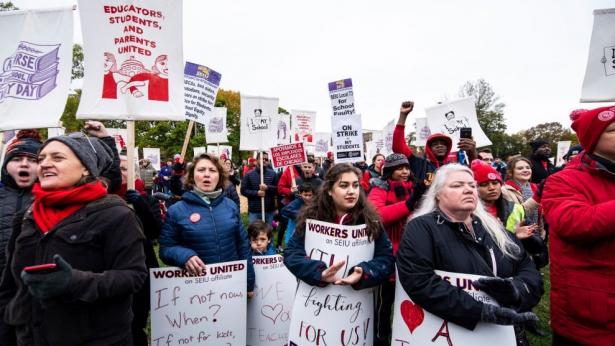
by James A. Bacon
The Wason Center at Christopher Newport University issued a new poll today which finds, among other things, that Virginians favor collective bargaining rights for public employees by a whopping 68% to 25% margin.
If that’s not scary enough, the poll likely understates the support for public-sector collective bargaining. Thirty-six percent of poll respondents identified themselves as Republicans compared to 34% Democrats — clearly under-sampling Democrats in a state which voted for Joe Biden over Donald Trump for president by a 54% to 45% margin. Equally disturbing, 44% of the respondents identified themselves as various shades of “conservative” compared to 4o% who described themselves as various shades of “liberal.”
How is it possible that a strong majority from this particular pool of people supports allowing public employees to join unions and negotiate for higher wages and pensions — a practice that is laying waste to state and local finances in states from California to Illinois, New Jersey to Connecticut?
Something has gone very, very awry.
Could the results be tainted by the way the question was asked?
Here’s the question:
“Currently, Virginia public employees do not have collective bargaining rights, which is the right to join a union and negotiate a contract. Do you support allowing public employees to the right to collective bargaining?”
That strikes me as pretty straightforward. I expect that we’d get very different answers if the question reminded respondents of the potential negative impact on fiscal integrity and taxes. But, then, Wason likely would have elicited even stronger support had it couched the question in terms of “fairness” for government employees. I can’t think of any less biased way of asking the question.
Speaking as a small-government conservative, I find this polling result terrifying. Virginia Republicans and conservatives have failed miserably in winning the war of ideas.
This year the Democrat-controlled General Assembly passed a law ending the statewide prohibition on public-sector collective bargaining. Beginning May 20201, cities, counties, towns, and school boards will be allowed (but not required) to authorize collective bargaining for their employees
Conferring collective-bargaining rights upon public employees, as I have written previously, will feed the symbiosis between Democratic elected officials (who will happily grant more lucrative pension benefits to their constituents) and public-employee unions (which will donate generously to Democratic officials). Virginia’s public-employee pension system is already under-funded by billions of dollars. The inevitable juicing of benefits will only make matters worse.
Higher taxes. Higher housing costs. Higher energy costs. Bigger pension liabilities. Failing schools. Young people leaving the state. Virginia is becoming New Jersey — without the vast accumulation of industrial-era wealth that allows the Garden State to survive its maladministration.

Leave a Reply
You must be logged in to post a comment.